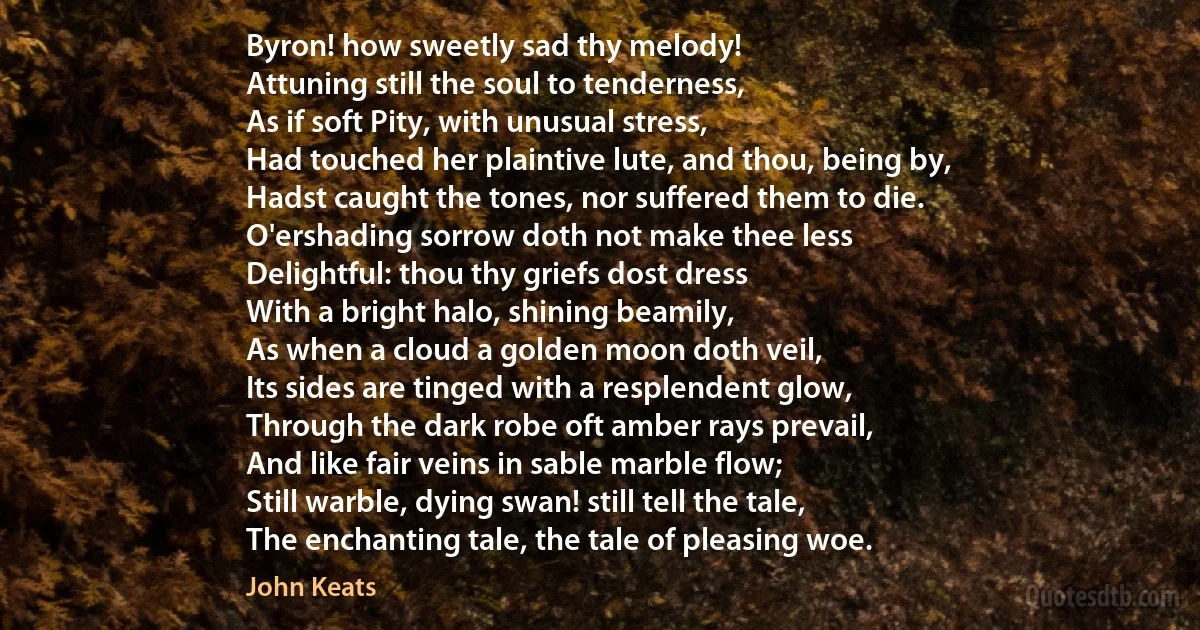
Byron! how sweetly sad thy melody! Attuning still the soul to tenderness, As if soft Pity, with unusual stress, Had touched her plaintive lute, and thou, being by, Hadst caught the tones, nor suffered them to die. O'ershading sorrow doth not make thee less Delightful: thou thy griefs dost dress With a bright halo, shining beamily, As when a cloud a golden moon doth veil, Its sides are tinged with a resplendent glow, Through the dark robe oft amber rays prevail, And like fair veins in sable marble flow; Still warble, dying swan! still tell the tale, The enchanting tale, the tale of pleasing woe.
John KeatsRelated topics
bright catch cloud dark die dying dress enchanting fair flow golden less melody moon nor oft pity plaintive pleasing sable sad shining soft sorrow soul stress tale tell thee thou woeRelated quotes
O power of Love, O wondrous mystery!
How is my dark illumined by thy light,
That maketh morning of my gloomy night,
Setting my soul from Sorrow's bondage free
With swift-sent revelation! Yea, I see
Beyond the limitation of my sight
And senses, comprehending now, aright,
Today's proportion to eternity.
Through thee, my faith in God is made me sure,
My searching eyes have pierced the misty veil;
The pain and anguish which stern Sorrow brings
Through thee become more easy to endure.
Love-strong I mount, and heaven's high summit scale;
Through thee, my soul has spread her folded wings.

Katrina Trask
O fortunate one, thy vow hath become successful. The lord of the celestials hath been gratified, and is willing to give thee a son such as thou desirest, of superhuman achievements and great fame. He will be the oppressor of all enemies and possessed of great wisdom. Endued with a great soul, in splendour equal unto the Sun, invincible in battles, and of great achievements, he will also be extremely handsome. O thou of fair hips and sweet smiles, the lord of the celestials hath become gracious to thee. Invoking him, bring thou forth a child who will be the very home of all Kshatriya virtues.

Kunti
Why, reader, truly, if they asked thee or me, Which way we meant to vote?-were it not our likeliest answer: Neither way! I, as a Tenpound Franchiser, will receive no bribe; but also I will not vote for either of these men. Neither Rigmarole nor Dolittle shall, by furtherance of mine, go and make laws for this country. I will have no hand in such a mission. How dare I! If other men cannot be got in England, a totally other sort of men, different as light is from dark, as star-fire is from street-mud, what is the use of votings, or of Parliaments in England?

Thomas Carlyle
If I should be, where I no more can hear
Thy voice, nor catch from thy wild eyes these gleams
Of past existence, wilt thou then forget
That on the banks of this delightful stream
We stood together; And that I, so long
A worshipper of Nature, hither came,
Unwearied in that service: rather say
With warmer love, oh! with far deeper zeal
Of holier love. Now wilt thou then forget,
That after many wanderings, many years
Of absence, these steep woods and lofty cliffs,
And this green pastoral landscape, were to me
More dear, both for themselves, and for thy sake.

William Wordsworth
I veil my face before thee, and lay my finger on my lips. What thou art in thyself, or how thou appearest to thyself, I can never know. After living through a thousand lives, I shall comprehend Thee as little as I do now in this mansion of clay. What I can comprehend, becomes finite by my mere comprehension, and this can never, by perpetual ascent, be transformed into the infinite, for it does not differ from it in degree merely, but in kind. By that ascent we may find a greater and greater man, but never a God, who is capable of no measurement.

Johann Gottlieb Fichte
